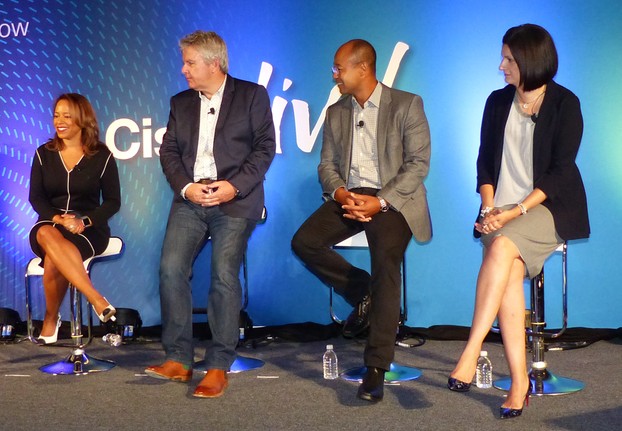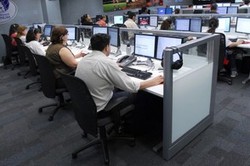Achieving the right workplace culture that helps every employee work to their very best every day can be difficult. Here, Steve Rogerson reports from the Cisco Live conference in Las Vegas in July 2016 on how this technology giant is trying to do just that for all its workers across all its locations.

Why having the right culture is important in a workplace
How to achieve a workplace culture where every employee is happy and giving their best to help the company
 From the left, Shari Slate, Chris Dedicoat, Hilton Romanski and Francine Katsoudas Photo by Steve Rogerson |
Some people hate going to work every day, others look forward to the challenges that may lie ahead. Most alternate between the two depending on what sort of day they are expecting. The problem for companies is how to have employees that fall mainly into the latter category.
Employees that want to tackle the day head on, that look forward to solving the problems that are put in front of them are employees that are more motivated and are more likely to bring value to the company.
Achieving that can be hard for any company but for a large networking technology company such as Cisco, it can be far too easy for employees to slip under the radar, do the bare minimum and not be as productive as their colleagues. To avoid this, it is important that a company adopts a culture that encourages active participation and innovation, and it was this that was the subject of a panel at the Cisco Live conference in Las Vegas in July 2016.
“Culture is one of the most important things you do as a company,” said Francine Katsoudas, a Cisco senior vice president and chief people officer. “We connect everything, people and technology, and we create an environment where people can create.”
Chris Dedicoat, Cisco’s executive vice president for worldwide sales, added: “The culture we have as a company extends very quickly to your customers, and that is the test of the culture as to whether it helps customers achieve their goals.”
Shari Slate, Cisco’s chief inclusion officer, agreed. She said: “Culture can be a competitive advantage. And diversity is going to play a role in getting us to where we want to be. We want to attract and retain the best talent, and for that you need passion, opportunity and possibilities, the opportunity to have a career path and as for possibility, we are in a company where you can create big things.”
Key to all this is to have an open culture where employees are listened to and their rewards are results oriented.
“Companies have to listen carefully to people who work in the organisation,” said Dedicoat. “It has to be an open culture. People can’t be afraid to say what they think. And the people who produce results have to be rewarded for the results.”
Part of the listening is understanding what is important to employees. Cisco asks employees what are the moments at work that are most important to them and then see what as a company it can do to enhance those moments.
“We want the best people and we want them to be at their very best,” said Katsoudas. “We strive to be a place where every employee, everywhere in the world, feels they have a voice.”
Change
But a successful workplace also has to be able to change with the times, both in bringing in new technologies as well as creating an atmosphere where employees want to learn.
We have to embrace the change that is happening around us,” said Hilton Romanski, Cisco’s chief strategy officer. “There has to be a willingness to change.”
Dedicoat added: “We have to work harder every day to keep them passionate and learning. Learning is one of the key factors. You need a learning culture.”
Another important aspect is making sure the company culture applies to all employees and not just those in key positions. A company works best if everyone from top to bottom is embracing the company culture.
“When we have events we always invite the catering and cleaning staff,” said Dedicoat. “It is important to them because it makes them feel part of the company. It is also important that the people at the reception desk embrace the culture of the company as that is who people see first.”
Teams
Cisco, like most companies, is split into teams and the culture within the team is just as important as that in the company as a whole.
“All the biggest breakthroughs have been through teams,” said Katsoudas. “You want members of the team to feel they are playing to their strengths every day.”
Romanski added: “Balance is really critical in a team, in terms of areas of technology and areas of culture. You want people to bring in different points of view.”
Conclusion
The goal of a culture is not just to make the workplace a nicer place to be but to encourage employees to give their best. As Katsoudas concluded: “We have to make it OK for employees to make mistakes and take risks. It is OK to trip and fall down. We want people to innovate every day.”
You might also like
Etiquette at Office Christmas PartiesThe dos and don'ts of surviving the annual office Christmas party.
Ten Golden Rules For Call Centre OperatorsA look at how call centre operators can keep their customers happy.






 KZine Issue 31: Review of October 2021 Issueon 11/07/2021
KZine Issue 31: Review of October 2021 Issueon 11/07/2021
 KZine Issue 30: Review of June 2021 Issueon 07/05/2021
KZine Issue 30: Review of June 2021 Issueon 07/05/2021
 KZine Issue 29: Review of February 2021 Issueon 02/23/2021
KZine Issue 29: Review of February 2021 Issueon 02/23/2021
 KZine Issue 28: Review of September 2020 Issueon 10/01/2020
KZine Issue 28: Review of September 2020 Issueon 10/01/2020



Comments
Dismissal was the last resort. I hated dismissing people.One time when I was chair of a gardening society I was obliged to dismiss my treasurer, not for dishonesty,but for neglect of duty. I hated doing it,but the preservation of the society demanded the dismissal..
It's not unexpected what you say about helping career-struggling people since you help environment-struggling sentient animals and plants so much.
Was it a tough individual decision to let someone go or was it always or sometimes a group decision?
When I was a team leader for an exam board I had the right to ask for a team member's dismissal. But I worked hard with struggling team members to save careers. I did dismiss on occasion,but as a last resort. Thus I created a good atmosphere in the team that I led.
The next-to-last subheading, Teams, describes Cisco as "split into teams and the culture within the team is just as important as that in the company as a whole."
This may or may not have been an authoritative source, but I remember reading that Elon Musk organized his company as a huge open space whereby everyone involved in the same aspect, rather than the same department, clustered together. So, for example, accountants, custodians and engineers would be attached to whatever aspect they dealt with -- let's say air-conditional systems for electric cars -- rather than being in the traditional all-accounting, all-custodial or all-engineering departments.
Would not physical arrangement of space have quite a potentially negative or positive impact upon the most productive, respectful workplace cultures?
The above-mentioned Musk arrangement would seem quite productive and respectful since it has a more macro view than the traditional view influenced by all one job description in one space.
Company size is a factor.